零起点大学英语基础教程第二册Unit3素材
大学英语第二册第三单元(B2-U3)讲稿
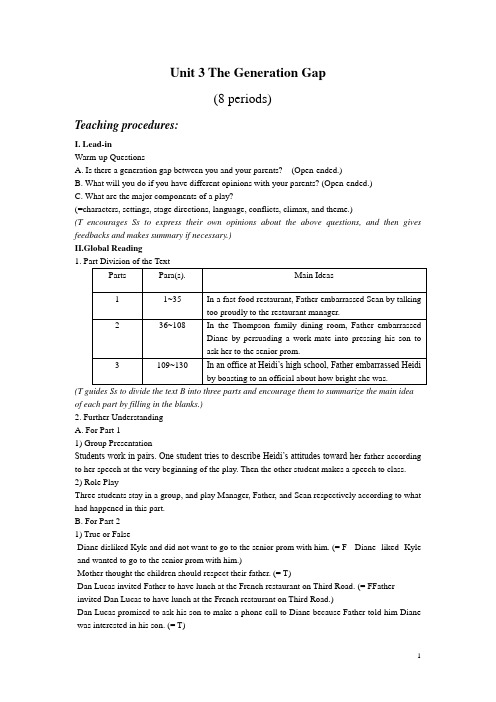
Unit 3 The Generation Gap(8 periods)Teaching procedures:I. Lead-inWarm-up QuestionsA. Is there a generation gap between you and your parents? (Open-ended.)B. What will you do if you have different opinions with your parents? (Open-ended.)C. What are the major components of a play?(=characters, settings, stage directions, language, conflicts, climax, and theme.)(T encourages Ss to express their own opinions about the above questions, and then gives feedbacks and makes summary if necessary.)II.Global Reading(T guides Ss to divide the text B into three parts and encourage them to summarize the main idea of each part by filling in the blanks.)2. Further UnderstandingA. For Part 11) Group PresentationStudents work in pairs. One student tries to describe Heidi’s attitudes toward he r father according to her speech at the very beginning of the play. Then the other student makes a speech to class. 2) Role PlayThree students stay in a group, and play Manager, Father, and Sean respectively according to what had happened in this part.B. For Part 21) True or FalseDiane disliked Kyle and did not want to go to the senior prom with him. (= F Diane liked Kyle and wanted to go to the senior prom with him.)Mother thought the children should respect their father. (= T)Dan Lucas invited Father to have lunch at the French restaurant on Third Road. (= F F ather invited Dan Lucas to have lunch at the French restaurant on Third Road.)Dan Lucas promised to ask his son to make a phone call to Diane because Father told him Diane was interested in his son. (= T)As an honor student, Diane was pleased with the result. (= F As an honor student, Diane was humiliated with the result.)2) Group DiscussionThree to four students stay in a group, and discuss the characteristics of Father, Mother and the children.C. For Part 31) Group DiscussionStudents form groups of three to four, and find out what Father said in the office. Then find out the response of Heidi and Mrs. Higgins. Discuss why they seemed to have different topics and what they thought during the interview.(= In the office Father boasted to Mrs. Higgins how bright Heidi was. He listed several examples.He kept on talking even though Mrs. Higgins was not interested in the topic. He showed a typical example of a proud father.Mrs. Higgins wanted to get down to business and finished the interview. So her topics focused on the enrolment of a new student. As she was frequently interrupted by Father, she got impatient anda little annoyed. But she tried to be polite and not to hurt the feelings of a proud father.Heidi was embarrassed when her father boasted to Mrs. Higgins. She tried to stop her father, but her father ignored her. She couldn’t understand her father’s pride.)2) Role PlayStudents form groups of three and act as Mrs. Higgins, Father, and Heidi according to what had happened in this part.III.Detailed ReadingDifficult Sentences1. (Title) “Father Knows Better”1. What does “Father knows better.” mean?(=“Father knows better.” or “Father, you know better than that.” literally means Father was wise enough not to do something. Actually it does not have this meaning. It means Father was not wise when he meddled with his children’s affairs.)2. How many times does this sentence occur in the text? What can you infer from the sentence?(=This sentence occurs six times in the text. The children said it satirically to show their disapproval of Father’s meddling with their affairs. )2. (LL.39~40) “I’m sure he’s a good worker but a typical teenager, if you know what I mean.”1. What did Father mean by saying this?(=Father was proud of his son as he thought his son would work well, but he was a little worried that his son was a boy and he might make some mistakes in his work.)2. What was the manager’s response?(=As a young man, the manager didn’t understand a father’s feeling, and showed no interests.)3. (LL.42~43) “And I assure you that if there are any subjects that need to be addressed, Seanand I will have a man-to-man talk.”1. What is a man-to-man talk?(=A talk that takes place between two men, especially two men who need to discuss a seriouspersonal matter.)2. Translate the sentence into Chinese.(=你放心,要是有什么问题需要解决的话,我和肖恩会开诚布公地谈一谈的。
《英语基础教程》第二册word版电子教案 Book 2 Unit 3 教案 Unit3-3
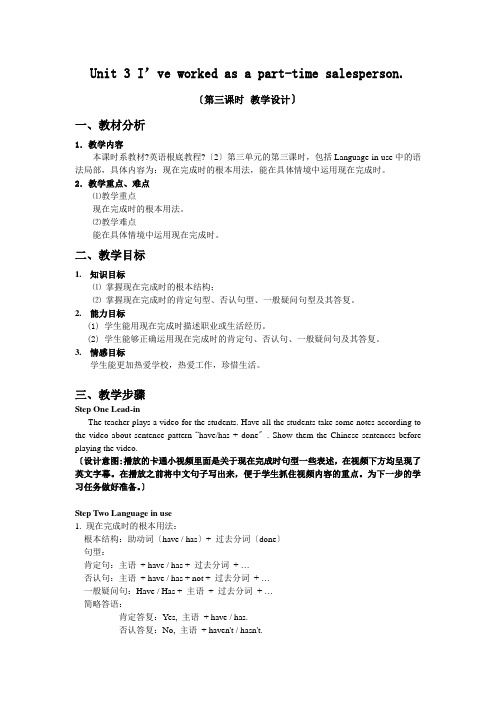
Unit 3 I’ve worked as a part-time salesperson.〔第三课时教学设计〕一、教材分析1.教学内容本课时系教材?英语根底教程?〔2〕第三单元的第三课时,包括Language in use中的语法局部,具体内容为:现在完成时的根本用法,能在具体情境中运用现在完成时。
2.教学重点、难点⑴教学重点现在完成时的根本用法。
⑵教学难点能在具体情境中运用现在完成时。
二、教学目标1.知识目标⑴掌握现在完成时的根本结构;⑵掌握现在完成时的肯定句型、否认句型、一般疑问句型及其答复。
2.能力目标(1) 学生能用现在完成时描述职业或生活经历。
(2) 学生能够正确运用现在完成时的肯定句、否认句、一般疑问句及其答复。
3.情感目标学生能更加热爱学校,热爱工作,珍惜生活。
三、教学步骤Step One Lead-inThe teacher plays a video for the students. Have all the students take some notes according to the video about sentence pattern “have/has + done〞. Show them the Chinese sentences before playing the video.〔设计意图:播放的卡通小视频里面是关于现在完成时句型一些表述,在视频下方均呈现了英文字幕。
在播放之前将中文句子写出来,便于学生抓住视频内容的重点。
为下一步的学习任务做好准备。
〕Step Two Language in use1. 现在完成时的根本用法:根本结构:助动词〔have / has〕+ 过去分词〔done〕句型:肯定句:主语+ have / has + 过去分词+ …否认句:主语+ have / has + not + 过去分词+ …一般疑问句:Have / Has + 主语+ 过去分词+ …简略答语:肯定答复:Yes, 主语+ have / has.否认答复:No, 主语+ haven't / hasn't.用法:现在完成时表示过去发生或已经完成的动作对现在造成的影响或产生的结果。
大学英语第二册第三单元知识点
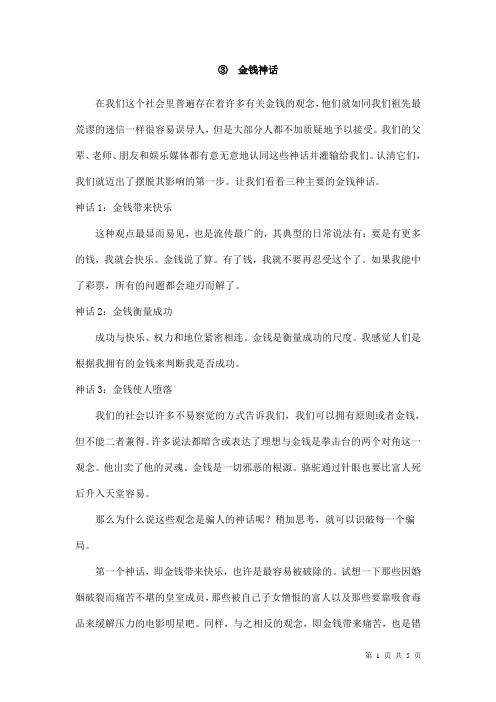
③金钱神话在我们这个社会里普遍存在着许多有关金钱的观念,他们就如同我们祖先最荒谬的迷信一样很容易误导人,但是大部分人都不加质疑地予以接受。
我们的父辈、老师、朋友和娱乐媒体都有意无意地认同这些神话并灌输给我们。
认清它们,我们就迈出了摆脱其影响的第一步。
让我们看看三种主要的金钱神话。
神话1:金钱带来快乐这种观点最显而易见,也是流传最广的,其典型的日常说法有:要是有更多的钱,我就会快乐。
金钱说了算。
有了钱,我就不要再忍受这个了。
如果我能中了彩票,所有的问题都会迎刃而解了。
神话2:金钱衡量成功成功与快乐、权力和地位紧密相连。
金钱是衡量成功的尺度。
我感觉人们是根据我拥有的金钱来判断我是否成功。
神话3:金钱使人堕落我们的社会以许多不易察觉的方式告诉我们,我们可以拥有原则或者金钱,但不能二者兼得。
许多说法都暗含或表达了理想与金钱是拳击台的两个对角这一观念。
他出卖了他的灵魂。
金钱是一切邪恶的根源。
骆驼通过针眼也要比富人死后升入天堂容易。
那么为什么说这些观念是骗人的神话呢?稍加思考,就可以识破每一个骗局。
第一个神话,即金钱带来快乐,也许是最容易被破除的。
试想一下那些因婚姻破裂而痛苦不堪的皇室成员,那些被自己子女憎恨的富人以及那些要靠吸食毒品来缓解压力的电影明星吧。
同样,与之相反的观念,即金钱带来痛苦,也是错误的,因为你可以轻而易举地找到有钱人对生活心满意足的例子。
事实上,我们让自己快乐或不快乐,这与我们有多少钱无关。
金钱衡量成功这一神话也一样容易被看穿。
虽然二者常常是形影不离,但金钱本身不能使人成功,反之亦然。
以阿尔伯特?爱因斯坦为例,没人会否认他是成功者。
然而,谁又对他挣多少钱感兴趣呢?使他成功的是他的智慧与成就。
金钱会使人堕落?如果真是如此,那么我们就有了一种好办法来判断某个特定的人有多堕落:只要看看其纳税单就行了。
很明显,这是荒唐的。
金钱本身并不邪恶。
同样,金钱也不会使人堕落。
堕落的人之所以堕落是因为他们不诚实,缺乏道德。
零起点大学英语基础教程2 Unit1-3
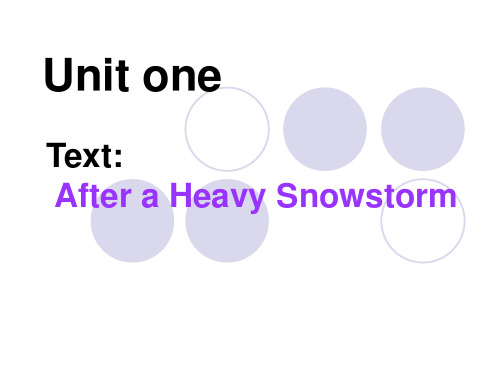
Heavy
light
Tell
Don’t tell my mother the secret. The doctor told me to wait in the lobby.
Be full of
They are full of hope. The gift is full of love. I am full of worry.
1would begin 2will leave, are going to leave 3 will say 4 will write 5 will go 6 would work 7 will be pleased 8 would pay
Байду номын сангаас
1 Are you leaving now? have fun. 2 When are you going to pay the workers? 3. Will you sing or tell a story at the party? 4 To the police’s surprise, the accident didn’t damage any car. 5 The box is very heavy, for it is full of books.
1. I am going to work with my father at the store. 2. Mr. Smith wanted to take his car out, so he paid a man to clean the path from his garage to his gate.
When shall we meet again?
3. 将来,孩子们会用电脑在家学习。 3. Kids will study at home on computers in the future.
大学英语第二册第3单元

• Part 5 Enjoy Yourself
UNIT 3
Holiday and Festival
Unit Goals
Functional English •Talking about personal ideal •Writing a leave or absence letter Grammar •Predicative clause Vocabulary • Words related to dream Intercultural Competence • Realizing the importance of dream and trying to make it come true
A. A medical college in Beijing. B. A hospital in his hometown.
C. A hospital in a big city.
D. A medical college in his hometown.
3. What is Chinese dream?
Listen to the monologue again and then answer the following question. What are the older generation's dreams? Their dreams are to (1) _________________________, (2)________________________ , (3)________________________, (4) ________________________ , and (5) ______________________.
大学英语精读第二册Unit3:LessonfromJefferson
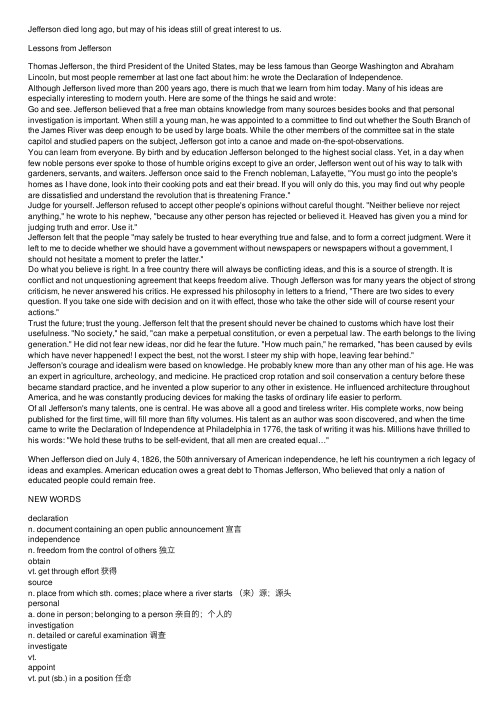
Jefferson died long ago, but may of his ideas still of great interest to us.Lessons from JeffersonThomas Jefferson, the third President of the United States, may be less famous than George Washington and Abraham Lincoln, but most people remember at last one fact about him: he wrote the Declaration of Independence.Although Jefferson lived more than 200 years ago, there is much that we learn from him today. Many of his ideas are especially interesting to modern youth. Here are some of the things he said and wrote:Go and see. Jefferson believed that a free man obtains knowledge from many sources besides books and that personal investigation is important. When still a young man, he was appointed to a committee to find out whether the South Branch of the James River was deep enough to be used by large boats. While the other members of the committee sat in the state capitol and studied papers on the subject, Jefferson got into a canoe and made on-the-spot-observations.You can learn from everyone. By birth and by education Jefferson belonged to the highest social class. Yet, in a day when few noble persons ever spoke to those of humble origins except to give an order, Jefferson went out of his way to talk with gardeners, servants, and waiters. Jefferson once said to the French nobleman, Lafayette, "You must go into the people's homes as I have done, look into their cooking pots and eat their bread. If you will only do this, you may find out why people are dissatisfied and understand the revolution that is threatening France."Judge for yourself. Jefferson refused to accept other people's opinions without careful thought. "Neither believe nor reject anything," he wrote to his nephew, "because any other person has rejected or believed it. Heaved has given you a mind for judging truth and error. Use it."Jefferson felt that the people "may safely be trusted to hear everything true and false, and to form a correct judgment. Were it left to me to decide whether we should have a government without newspapers or newspapers without a government, I should not hesitate a moment to prefer the latter."Do what you believe is right. In a free country there will always be conflicting ideas, and this is a source of strength. It is conflict and not unquestioning agreement that keeps freedom alive. Though Jefferson was for many years the object of strong criticism, he never answered his critics. He expressed his philosophy in letters to a friend, "There are two sides to every question. If you take one side with decision and on it with effect, those who take the other side will of course resent your actions."Trust the future; trust the young. Jefferson felt that the present should never be chained to customs which have lost their usefulness. "No society," he said, "can make a perpetual constitution, or even a perpetual law. The earth belongs to the living generation." He did not fear new ideas, nor did he fear the future. "How much pain," he remarked, "has been caused by evils which have never happened! I expect the best, not the worst. I steer my ship with hope, leaving fear behind."Jefferson's courage and idealism were based on knowledge. He probably knew more than any other man of his age. He was an expert in agriculture, archeology, and medicine. He practiced crop rotation and soil conservation a century before these became standard practice, and he invented a plow superior to any other in existence. He influenced architecture throughout America, and he was constantly producing devices for making the tasks of ordinary life easier to perform.Of all Jefferson's many talents, one is central. He was above all a good and tireless writer. His complete works, now being published for the first time, will fill more than fifty volumes. His talent as an author was soon discovered, and when the time came to write the Declaration of Independence at Philadelphia in 1776, the task of writing it was his. Millions have thrilled to his words: "We hold these truths to be self-evident, that all men are created equal…"When Jefferson died on July 4, 1826, the 50th anniversary of American independence, he left his countrymen a rich legacy of ideas and examples. American education owes a great debt to Thomas Jefferson, Who believed that only a nation of educated people could remain free.NEW WORDSdeclarationn. document containing an open public announcement 宣⾔independencen. freedom from the control of others 独⽴obtainvt. get through effort 获得sourcen. place from which sth. comes; place where a river starts (来)源;源头personala. done in person; belonging to a person 亲⾃的;个⼈的investigationn. detailed or careful examination 调查investigatevt.appointvt. put (sb.) in a position 任命appointmentn.committeen. a group of people chosen for special duties 委员会capitoln. (美国)州议会⼤厦canoen. light boat moved by a paddle 独⽊⾈on-the-spota. at the place of the action 现场的humblea. low in position 地位低下的originn. parentage; birth; beginning ⾎统;出⾝;起源gardenern. person who works in a garden either for pay or as a hobby 园丁waitern. person who serves food to the tables in a restaurant (男)侍者noblemann. 贵族dissatisfyvt. hang over dangerously; utter a threat against 使不满threatenvt. hang over dangerously; utter a threat against 威胁threatn.rejectvt. refuse to take, believe, use of consider 拒绝rejectionn.nephewn. the son of one's brother or sistererrorn. mistake; sth. done wronglyfalsea. not true or correctjudgmentn. opinion 判断,看法hesitatevi. feel doubtful; be undecided 犹豫,迟疑不决hesitationn.prefervt. like better; choose (one thing) rather than (another) 更喜欢;宁愿preferencen.lattera. nearer to the end 后⾯的;后半的n. the second of two persons or things just spoken of 后者conflictn. be opposed; clash 冲突n. disagreement; clash; fightunquestioninga. given or done without question or doubtagreementn. having the same opinion(s); thinking in the same way 同意;⼀致的criticismn. unfavourable remarks of judgments 批评criticn. person who makes judgments about the good and bad qualities of sth.; person who points out mistakes 评论家;批评者criticizevt.philosophyn. 哲学resentvt. feel angry or bitter at 对...忿恨;对...不满actionn. the process of doing things; sth. done ⾏动过程;⾏动customn. 习惯,风俗perpetuala. never-ending; going on for a long time or without stopping 永恒的;连续不断的constitutionn. 宪法;章程livinga. alive now 活(着)的remarkvt. say; comment 说;评论说n. 话语;评论eviln. sth. bad; sin 邪恶,罪恶a. very bad 邪恶的,坏的idealismn. 理想主义;唯⼼主义arch(a)eologyn. study of ancient things, esp. remains of prehistoric times 考古学rotationn. 轮作;旋转rotatev.conservationn. protecting from loss of from being used up 保护;保存conservevt.superiora. good or better in quality or value 较好的;优的superiorityn.existencen. the state of existing 存在influencevt. have an effect on 影响architecturen. art and science of building 建筑术;建筑学constantlyad. continuously; frequently 不断地;经常地constanta.performvt. do, carry out 做,履⾏talentn. special natural ability 才能,天资centrala. chief; main; most important 主要的tirelessa. never or rarely getting tiredwritern. a person who writes esp. as a way of earning money 作家publishvt. have (a book, etc.) printed and put on sale 出版volumen. book, esp. one of a set of books 卷;册thrillvi. have a very exciting feeling ⾮常激动self-evidenta. clear without proof 不⾔⽽喻的createvt. make (sth. that has not been made before) 创造creationn.anniversaryn. the yearly return of a special date 周年纪念⽇countrymann. a person from one's own country 周胞legacyn. sth. that one person leaves to another when he dies 遗产owevt. ⽋(债等);应把...归功于debtn. something owed to someone else 债(务)educatevt. train; teach how to read, write, think, etc.。
基础英语第二册第三单元
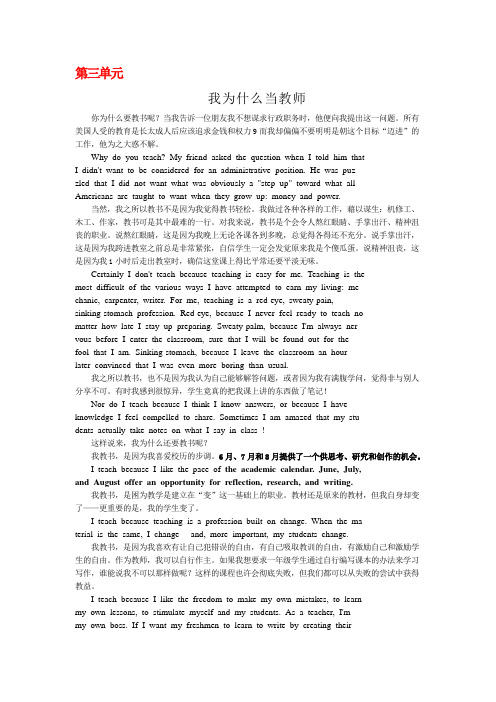
第三单元我为什么当教师你为什么要教书呢?当我告诉一位朋友我不想谋求行政职务时,他便向我提出这一问题。
所有美国人受的教育是长太成人后应该追求金钱和权力9而我却偏偏不要明明是朝这个目标“迈进”的工作,他为之大惑不解。
Why do you teach? My friend asked the question when I told him thatI didn't want to be considered for an administrative position. He was puz-zled that I did not want what was obviously a "step up" toward what allAmericans are taught to want when they grow up: money and power.当然,我之所以教书不是因为我觉得教书轻松。
我做过各种各样的工作,藉以谋生:机修工、木工、作家,教书可是其中最难的一行。
对我来说,教书是个会令人熬红眼睛、手掌出汗、精神沮丧的职业。
说熬红眼睛,这是因为我晚上无论各课各到多晚,总觉得各得还不充分。
说手掌出汗,这是因为我跨进教室之前总是非常紧张,自信学生一定会发觉原来我是个傻瓜蛋。
说精神沮丧,这是因为我1小时后走出教室时,确信这堂课上得比平常还要平淡无味。
Certainly I don't teach because teaching is easy for me. Teaching is themost difficult of the various ways I have attempted to earn my living: me-chanic, carpenter, writer. For me, teaching is a red-eye, sweaty-pain,sinking-stomach profession. Red-eye, because I never feel ready to teach nomatter how late I stay up preparing. Sweaty-palm, because I'm always ner-vous before I enter the classroom, sure that I will be found out for thefool that I am. Sinking-stomach, because I leave the classroom an hourlater convinced that I was even more boring than usual.我之所以教书,也不是因为我认为自己能够解答问题,或者因为我有满腹学问,觉得非与别人分享不可。
英语(基础模块)第二册课件Unit 3 Computer and Internet
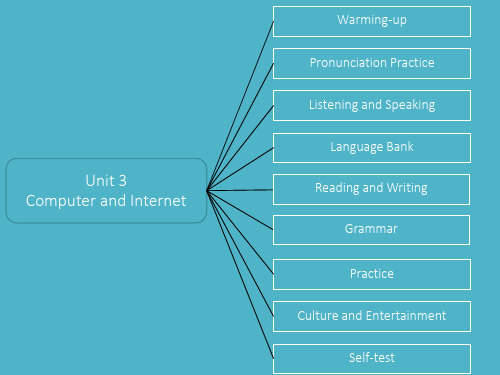
我想给你推荐几个好的网站。
Reading and Writing
Unit 3 Computer and
Internet
Reading
Discuss the following questions after reading.
(1) What does the writer usually do on the Internet? (2) What problems does the writer realize? (3) What does he do to solve the problems?
Unit 3 Computer and
Internet
• I am a bit addicted to chatting with...online.
我有点沉迷于跟……网上聊天。
• You’d better stop playing computer games at once.
你最好立刻序数词代表分母。分子大于1时,分子的 基数词用单数,分母的序数词用复数。如:1/3(one third); 3/7(three sevenths)。
Listening and Speaking
Unit 3 Computer and
Internet
Key word surf v. 冲浪
website n. 网站
download v. 下载 mind-blowing adj. 令人极度震惊的
image n. 图片
wallpaper n. 墙纸
disk n. 磁盘
addictive adj. 令人上瘾的
I’m just downloading an image from this Website. 我正在从这个网站下载一张图片。
《英语基础教程》第二册word版电子教案 Unit 1-3

Unit 1 We burst into laughter.(第三课时教学设计)Grammar focus一、教材分析1.教学内容(2)第一单元的第三课时,包括Language in use中Grammar 本课时系教材《英语基础教程》focus部分,具体内容为:一般过去时肯定句以及否定句的基本用法。
2.教学重点、难点⑴教学重点(1)一般过去时肯定句的基本用法;(2)一般过去时否定句的基本用法。
⑵教学难点能够运用一般过去时描述过去发生的事情。
二、教学目标⑴一般过去时的肯定句构成和用法;⑵一般过去时否定句的构成和用法。
(3)能够理解并识记动词过去式的变化规则。
2. 能力目标⑴能够正确运用一般过去时的肯定句;⑵能够正确运用一般过去时的否定句;(3)能够运用一般过去时描述过去的经历。
3. 情感目标通过描述自己过去的经历,让学生互相更多了解,增进学生之间的感情。
三、教学步骤Step One Lead-inRead Li Hua’s diary, and take notes of the part of verb.February 5, Friday, SunnyToday I got up early and helped my mother cook breakfast. Then I washed the dishes and cleaned the rooms. At nine o’clock I went shopping with my parents by car. There were so many people in the street, so the car moved slowly. It took us about an hour to get to Wumart. We bought lots of food and drink because Spring Festival was coming. In the afternoon I visited my friends and played table tennis with them. I surfed the Internet and read books in the evening. I didn’t go to bed until half past ten. What a meaningful day!They are simple past tense.(设计意图:用图文并茂的形式导入,引起学生的兴趣,故事内容贴近学生生活实际。
《英语》(基础模块)第二册(外语与教研出版社)教案unit3,3-推荐下载
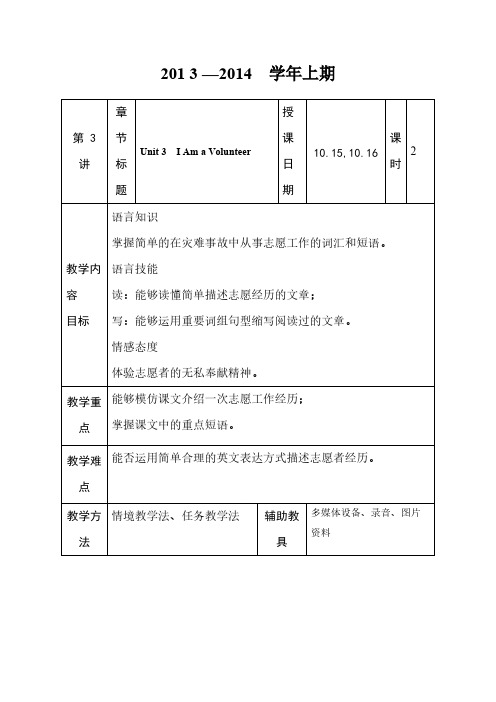
201 3 —2014 学年上期第 3 讲章节标题Unit 3 I Am a Volunteer授课日期10.15,10.16课时2教学内容目标语言知识掌握简单的在灾难事故中从事志愿工作的词汇和短语。
语言技能读:能够读懂简单描述志愿经历的文章;写:能够运用重要词组句型缩写阅读过的文章。
情感态度体验志愿者的无私奉献精神。
教学重点能够模仿课文介绍一次志愿工作经历;掌握课文中的重点短语。
教学难点能否运用简单合理的英文表达方式描述志愿者经历。
教学方法情境教学法、任务教学法辅助教具多媒体设备、录音、图片资料教学过程复习导入以图片方式展示上节课的重点词汇,学生见到图片要说出对应的单词,随机检查。
共同回答上节课的问题,How many kinds of voluntary work do you know?进一步提问到2008年对中国来说是意义重大的一年,为什么?学生会想到奥运会和汶川地震,进而想到这两个大事件都需要很多的志愿者。
看图说词,回答问题。
阅读Pre-reading:1)处理单词:a. 用图片和英文解释介绍disaster,victim, injured, relief;b. 用英文解释survive, survivor,ordinary和feel proud of;c. 使用带有糖和盐的标识的小瓶介绍label的用法,同时复习上一单元关系代词which引导定语从句的用法。
Please pass me the bottle which islabelled “Salt” or “Sugar”.提供实物让学生用sth. islabelled…造句。
2)出示汶川地震中有关志愿者工作的照片,提问:a. According to the pictures what event can you think about?b. The article is just about Yang Gang’s voluntary work in Wenchuan.While-reading:1)Please read it carefully and find theanswers to the following questions:a. When did the earthquakehappen?b. Who offered help in thedisaster?c. Why did Yang Gang feelproud of himself?完成课后练习3。
基础英语2unit3ppT
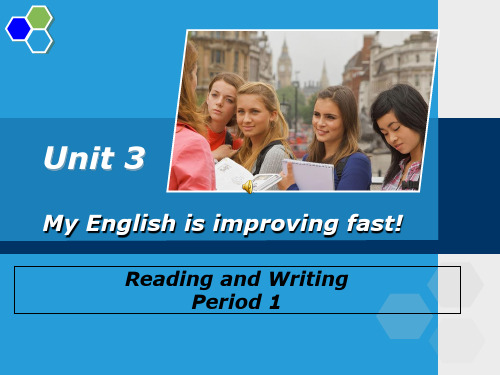
Reading and Writing
3 Share your stories. 讲述你生活中运用英语的故事。
Homework:
1.Memorize the key words, phrases and sentences in this class. 记本课中的重点单词,短语和句子。
2.Make a survey in your group about “Do you think English is important or not? Why?”. And make a PPT each grop and show the result of your group's survey in the next class. 在你的小组作调查:英语重要吗?为什 么?每组做一个PPT,下节课把你们的 调查结果呈现出来。
Scan the passage again and decide the following sentences true or false:
1. The foreigner could understand the attendant very well.( F )
2. The attendant told me that the foreigner wanted to take off a glass.( F )
Unit 3
My English is improving fast!
Reading and Writing Period 1
一,Lead in (视频)
Answer these questions:
Skim this passage quickly and answer the follwing quetions :
最新《英语》(基础模块)(修订版)第二册第三单元资料

教学任务:以听说为主。复习一些国家名称,讨论它们使用的语言,运用听力策略掌握录音内容、提高听力能力,讨论不同工作对英语的要求,使学生意识到英语学习的重要性。
第2课时:教学内容:Listening and Speaking④⑤
More Activities①②
第4课时:教学内容:Reading and Writing③⑤&Around World
Fun Time&My Progress Check
教学任务:以说为主。通过有趣的英语活动让学生体验和享受英语的乐趣并进行语言表达技能训练。让学生把课前通过查阅资料所完成的结果带到课堂口头进行交流分享。通过竞赛形式复习本单元重点词语和句子,帮助学生了解自己对本单元内容的掌握情况。
对策:注重学习策略的培养,分层教学要求,充分开展合作学习,让每个学生在团队的探讨分享中找到适合自己的学习方法,并在分工合作中各尽其能,资源共享、提高自信。
课时划分
根据语言的学习规律,遵循从输入到输出的过程,对本单元的教学内容进行适当整合,根据教学主题和任务进行重组,划分为4个课时,每课时45分钟。
第1课时:教学内容:Warming up①②
information,listening for detail.
情感目标:1.意识到英语学习的重要性。
2.关注并思考自己的英语学习状态。
3.培养合作互助的学习习惯。
教学
重点
掌握谈论英语学习的词汇;
掌握谈论语言和对英语学习及需求的语句。
教学
难点
引导学生结合自己的职业规划谈论一些工作岗位对英语的要求。
二、分课时教学设计
第1课时
教学
目标
大学英语第二册第三单元(B2-U3)讲稿
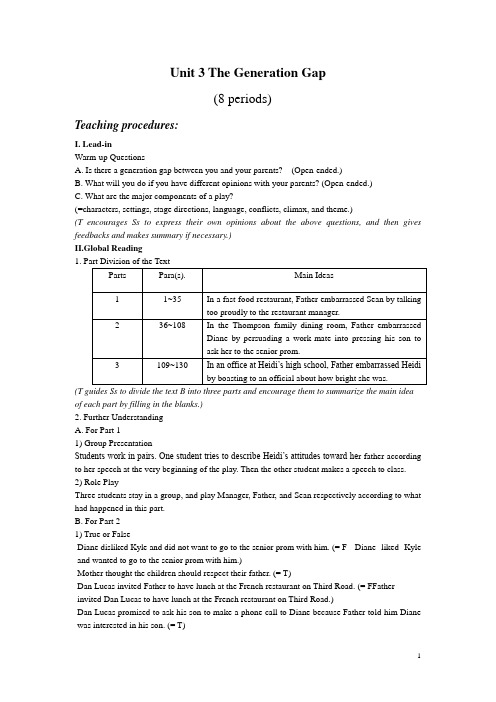
Unit 3 The Generation Gap(8 periods)Teaching procedures:I. Lead-inWarm-up QuestionsA. Is there a generation gap between you and your parents? (Open-ended.)B. What will you do if you have different opinions with your parents? (Open-ended.)C. What are the major components of a play?(=characters, settings, stage directions, language, conflicts, climax, and theme.)(T encourages Ss to express their own opinions about the above questions, and then gives feedbacks and makes summary if necessary.)II.Global Reading(T guides Ss to divide the text B into three parts and encourage them to summarize the main idea of each part by filling in the blanks.)2. Further UnderstandingA. For Part 11) Group PresentationStudents work in pairs. One student tries to describe Heidi’s attitudes toward he r father according to her speech at the very beginning of the play. Then the other student makes a speech to class. 2) Role PlayThree students stay in a group, and play Manager, Father, and Sean respectively according to what had happened in this part.B. For Part 21) True or FalseDiane disliked Kyle and did not want to go to the senior prom with him. (= F Diane liked Kyle and wanted to go to the senior prom with him.)Mother thought the children should respect their father. (= T)Dan Lucas invited Father to have lunch at the French restaurant on Third Road. (= F F ather invited Dan Lucas to have lunch at the French restaurant on Third Road.)Dan Lucas promised to ask his son to make a phone call to Diane because Father told him Diane was interested in his son. (= T)As an honor student, Diane was pleased with the result. (= F As an honor student, Diane was humiliated with the result.)2) Group DiscussionThree to four students stay in a group, and discuss the characteristics of Father, Mother and the children.C. For Part 31) Group DiscussionStudents form groups of three to four, and find out what Father said in the office. Then find out the response of Heidi and Mrs. Higgins. Discuss why they seemed to have different topics and what they thought during the interview.(= In the office Father boasted to Mrs. Higgins how bright Heidi was. He listed several examples.He kept on talking even though Mrs. Higgins was not interested in the topic. He showed a typical example of a proud father.Mrs. Higgins wanted to get down to business and finished the interview. So her topics focused on the enrolment of a new student. As she was frequently interrupted by Father, she got impatient anda little annoyed. But she tried to be polite and not to hurt the feelings of a proud father.Heidi was embarrassed when her father boasted to Mrs. Higgins. She tried to stop her father, but her father ignored her. She couldn’t understand her father’s pride.)2) Role PlayStudents form groups of three and act as Mrs. Higgins, Father, and Heidi according to what had happened in this part.III.Detailed ReadingDifficult Sentences1. (Title) “Father Knows Better”1. What does “Father knows better.” mean?(=“Father knows better.” or “Father, you know better than that.” literally means Father was wise enough not to do something. Actually it does not have this meaning. It means Father was not wise when he meddled with his children’s affairs.)2. How many times does this sentence occur in the text? What can you infer from the sentence?(=This sentence occurs six times in the text. The children said it satirically to show their disapproval of Father’s meddling with their affairs. )2. (LL.39~40) “I’m sure he’s a good worker but a typical teenager, if you know what I mean.”1. What did Father mean by saying this?(=Father was proud of his son as he thought his son would work well, but he was a little worried that his son was a boy and he might make some mistakes in his work.)2. What was the manager’s response?(=As a young man, the manager didn’t understand a father’s feeling, and showed no interests.)3. (LL.42~43) “And I assure you that if there are any subjects that need to be addressed, Seanand I will have a man-to-man talk.”1. What is a man-to-man talk?(=A talk that takes place between two men, especially two men who need to discuss a seriouspersonal matter.)2. Translate the sentence into Chinese.(=你放心,要是有什么问题需要解决的话,我和肖恩会开诚布公地谈一谈的。
大学英语第二册第三单元(B2-U3)讲稿

Unit 3 The Generation Gap(8 periods)Teaching procedures:I. Lead-inWarm-up QuestionsA. Is there a generation gap between you and your parents? (Open-ended.)B. What will you do if you have different opinions with your parents? (Open-ended.)C. What are the major components of a play?(=characters, settings, stage directions, language, conflicts, climax, and theme.)(T encourages Ss to express their own opinions about the above questions, and then gives feedbacks and makes summary if necessary.)II.Global Reading(T guides Ss to divide the text B into three parts and encourage them to summarize the main idea of each part by filling in the blanks.)2. Further UnderstandingA. For Part 11) Group PresentationStudents work in pairs. One student tries to describe Heidi’s attitudes toward he r father according to her speech at the very beginning of the play. Then the other student makes a speech to class. 2) Role PlayThree students stay in a group, and play Manager, Father, and Sean respectively according to what had happened in this part.B. For Part 21) True or FalseDiane disliked Kyle and did not want to go to the senior prom with him. (= F Diane liked Kyle and wanted to go to the senior prom with him.)Mother thought the children should respect their father. (= T)Dan Lucas invited Father to have lunch at the French restaurant on Third Road. (= F F ather invited Dan Lucas to have lunch at the French restaurant on Third Road.)Dan Lucas promised to ask his son to make a phone call to Diane because Father told him Diane was interested in his son. (= T)As an honor student, Diane was pleased with the result. (= F As an honor student, Diane was humiliated with the result.)2) Group DiscussionThree to four students stay in a group, and discuss the characteristics of Father, Mother and the children.C. For Part 31) Group DiscussionStudents form groups of three to four, and find out what Father said in the office. Then find out the response of Heidi and Mrs. Higgins. Discuss why they seemed to have different topics and what they thought during the interview.(= In the office Father boasted to Mrs. Higgins how bright Heidi was. He listed several examples.He kept on talking even though Mrs. Higgins was not interested in the topic. He showed a typical example of a proud father.Mrs. Higgins wanted to get down to business and finished the interview. So her topics focused on the enrolment of a new student. As she was frequently interrupted by Father, she got impatient anda little annoyed. But she tried to be polite and not to hurt the feelings of a proud father.Heidi was embarrassed when her father boasted to Mrs. Higgins. She tried to stop her father, but her father ignored her. She couldn’t understand her father’s pride.)2) Role PlayStudents form groups of three and act as Mrs. Higgins, Father, and Heidi according to what had happened in this part.III.Detailed ReadingDifficult Sentences1. (Title) “Father Knows Better”1. What does “Father knows better.” mean?(=“Father knows better.” or “Father, you know better than that.” literally means Father was wise enough not to do something. Actually it does not have this meaning. It means Father was not wise when he meddled with his children’s affairs.)2. How many times does this sentence occur in the text? What can you infer from the sentence?(=This sentence occurs six times in the text. The children said it satirically to show their disapproval of Father’s meddling with their affairs. )2. (LL.39~40) “I’m sure he’s a good worker but a typical teenager, if you know what I mean.”1. What did Father mean by saying this?(=Father was proud of his son as he thought his son would work well, but he was a little worried that his son was a boy and he might make some mistakes in his work.)2. What was the manager’s response?(=As a young man, the manager didn’t understand a father’s feeling, and showed no interests.)3. (LL.42~43) “And I assure you that if there are any subjects that need to be addressed, Seanand I will have a man-to-man talk.”1. What is a man-to-man talk?(=A talk that takes place between two men, especially two men who need to discuss a seriouspersonal matter.)2. Translate the sentence into Chinese.(=你放心,要是有什么问题需要解决的话,我和肖恩会开诚布公地谈一谈的。
新编大学英语第二册-Unit-3-Born-to-Win
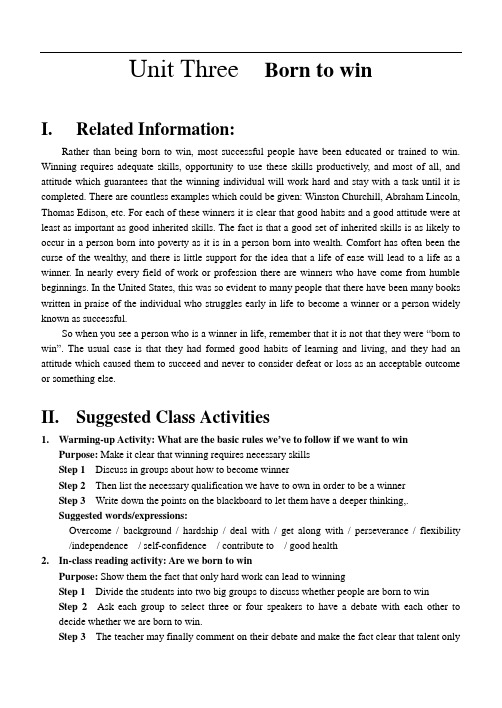
Unit Three Born to winI.Related Information:Rather than being born to win, most successful people have been educated or trained to win. Winning requires adequate skills, opportunity to use these skills productively, and most of all, and attitude which guarantees that the winning individual will work hard and stay with a task until it is completed. There are countless examples which could be given: Winston Churchill, Abraham Lincoln, Thomas Edison, etc. For each of these winners it is clear that good habits and a good attitude were at least as important as good inherited skills. The fact is that a good set of inherited skills is as likely to occur in a person born into poverty as it is in a person born into wealth. Comfort has often been the curse of the wealthy, and there is little support for the idea that a life of ease will lead to a life as a winner. In nearly every field of work or profession there are winners who have come from humble beginnings. In the United States, this was so evident to many people that there have been many books written in praise of the individual who struggles early in life to become a winner or a person widely known as successful.So when you see a person who is a winner in life, remember that it is not that they were “born to win”. The usual case is that they had formed good habits of learning and living, and they had an attitude which caused them to succeed and never to consider defeat or loss as an acceptable outcome or something else.II.Suggested Class Activities1.Warming-up Activity: What are the basic rules we’ve to follow if we want to winPurpose: Make it clear that winning requires necessary skillsStep 1 Discuss in groups about how to become winnerStep 2 Then list the necessary qualification we have to own in order to be a winnerStep 3Write down the points on the blackboard to let them have a deeper thinking,.Suggested words/expressions:Overcome / background / hardship / deal with / get along with / perseverance / flexibility /independence / self-confidence / contribute to / good health2.In-class reading activity: Are we born to winPurpose: Show them the fact that only hard work can lead to winningStep 1Divide the students into two big groups to discuss whether people are born to winStep 2Ask each group to select three or four speakers to have a debate with each other to decide whether we are born to win.Step 3 The teacher may finally comment on their debate and make the fact clear that talent onlyplays a minor important part in one’s life.Suggested words/expressions:Appropriately / capacity / creativity / evaluate / potential / inadequate / responsive / call forIII.Further development:Live your dreamsStep 1 Write down on a piece of paper what you think you will be doing 10 years later from now on..Step 2Write down on the other side of the paper what you dream to be doing 10 years later form now on.Step 3If your answers are different, try to explain what is preventing you from living your dreams to other members in your group. And try to help each other to build up confidence.IV.In-Class ReadingQuestions for consideration1.What is the most important thing for winners?2.What characteristics do winners share?3.What are the main features of losers?4.For most of your time are you a winner or a loser?5.What can we learn from the passage?OrganizationPart one (para. one) Each person has the potential to win in his own way.Part two (para.2) The meaning of “winner” and “loser”.Part three (para. 3) Few people are winners and losers all the time.Part four (para. 4-7) Characteristic of a winner.Part five (para. 8-10) Characteristic of a loser.Main ideaEach human being has his own unique capabilities and limitations, so few people are winners or losers all the time. A winner is not afraid to do his own thinking and to use his own knowledge. He listens to others, evaluates what they say, but comes to his own conclusion. He doesn’t have to respond in known, rigid ways. He can change his plans when the situation calls for it. Even in the face of national and international difficulty, he does not see himself as helpless. A loser begins to avoid becoming independent and is held back by his low capacity to appropriately express himself through a full range of possible behavior. A lose r can’t enter into close, honest, direct relationships with others.Words and phrases1. Appropriate; suitable; proper.这组词都表示"合适的、合理的"。
大学英语基础教程(北大修订版)教案第二册Unit Three

Unit ThreeTeaching Objectives:By the end of this unit, the students will be expected to be able to1. talk about ways to live a happy life;2. use skillfully the 15 new words and 8 new phrases and expressions learned in TEXT A in brief conversations and writings, and be familiar with the words and phrases learned in the text;3. get to know something about “the revelation of life” and learn as many language points as possible in TEXT B;4. consolidate the basic grammar on the simple present tense;5. know the use of gerund6. read material on a similar topic and with a similar degree of difficulty. Teaching Methods: Lecture, Discussion, Role-playUnit Duration: 8 class hours(45 minutes each)Teaching procedures:I. PreparatoryW ords and Phrases Learned in Display1.apply: to make a formal request for something2.fundamental: fundamentally (adv.)3.determine: determined (adj.)4.concentrate: concentration (n.); concentrated (adj.)5.wander: go around without a clear direction or purpose6.overall: considering or including everything7.particular: particularity (n.); particularly (adv.)8.perspective: syn. Viewpoint9.negative: harmful, an pleasant, or not wanted; (antonym) positive10.positive: good or useful; expressing support, agreement, or approval;(antonym) negativeExpressions Learned In Display1. participate in2. lines in3. set aside4. reflecting | on5. has an effect onII. Language In Context1. Introductory RemarksHow will you know you can succeed at something if you don't give it a try?How will you know you can drag yourself out of the depths of your despair if you don't try?How do you know you won't get that new job if you don't apply?How do you know...Before becoming a success at anything, you must take that first step.2. Language Points1.How do you know you won’t get that new job if you don’t apply?apply v. 1)apply(to sb.)(for sth.) :make a formal request 申请;请求eg: You should apply immediately, in person or by letter.你应该立即申请,亲自去也好,写信也好。
基础英语(第二册)PPTunit 3

Passage : Weather Forecast
Passage
Not only scientists but farmers have studied weather forecast. People, for many centuries and in all countries, have studied the weather and tried to make weather forecasts. Sometimes distant objects such as hills and tall trees seem to be very clear and near. This is a sign of much water in the air, and therefore a rain will probably come. When distant sounds (such as the noise from a train, birds singing, or people’s shouting) are very clearly heard, then wet and stormy weather is on the way. Rings round the sun are a sign of the coming rain. Many people feel the coming of wet weather in their bones. Their wound aches slightly or seriously. Some birds or insects like bees fly high if fine weather is coming, but they fly very near the ground if rainy weather or a storm is on the way. This is probably because the insects, which they are hunting, fly low at that time.
基础英语2 Unit3
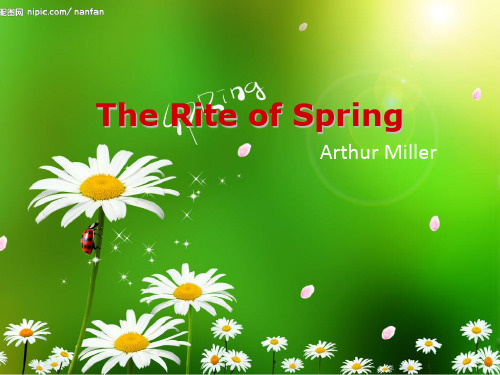
Revision
The Rite of Spring
Unit 3
W arming up
B ackground
T ext R einforcement
Warming up
Objectives
• Know something about the author • Understand the genre of essay • Learn how to interpret and appreciate literary essay
Abstract-universal: these
essays "make the best ... of all the three
worlds in which it is possible for the essay to exist".
Background
Genre Literary Essay
Aldous
Huxley: a literary device for saying almost everything about almost anything
Personal and the
autobiographical: these use "fragments of reflective autobiography" to "look at the world through the keyhole of anecdote and description ".
II. Why
gardening? (3-10)
Gardening involves conflict and choice-making.
- 1、下载文档前请自行甄别文档内容的完整性,平台不提供额外的编辑、内容补充、找答案等附加服务。
- 2、"仅部分预览"的文档,不可在线预览部分如存在完整性等问题,可反馈申请退款(可完整预览的文档不适用该条件!)。
- 3、如文档侵犯您的权益,请联系客服反馈,我们会尽快为您处理(人工客服工作时间:9:00-18:30)。
Tense Active voice Passive voice 一般现在时 do am/ is/ are done 一般过去时 did was/ were done 将来时 will/ would do will/ would be done 进行时 be doing be being done 完成时 have/ had done have/ had been done 情态动词 情态动词+ do 情态动词+ be done
★The crown she wears on her head has seven points. Those represent the seven continents of the world.
The tablet she holds in her left hand is inscribed with "July IV, MDCCLXXVI," (July 4, 1776, the date the Declaration of Independence was signed).
1. Raise v. 举起,抬起 He raised his glass and said: “Your health, Carl.” n. 加薪;加薪额 give sb a raise 经理决定给约翰加薪200美元。 The manager decided to give John a raise of $200.
被动语态用法:
• • • • • • • • • • a.动作的执行者不明确时 Rick has been sent to New York. b. 需要用by 短语时 The window was broken by Tom yesterday. c. 情态动词+ be + 过去分词 Dogs and bad guys may not be allowed to enter. d. 带双宾语的主动语态变被动语态时 He gave my brother a book. My brother was given a book by him. A book was given to my brother by him.
2. agree a. agree with sb 同意某个人的意见 Do you agree with me? b. agree to sth 表示同意某一建议、计划、安排等,后面跟一个表 示这类事的名词。 I don't agree to the plan\suggestion\arrangement. c. agree to do sth 答应做某事 他答应载我回家。 He agreed to drive me home. Mark the sentences in Column A as 1, 2, 3, 4, 5, 6, 7, then the proper answers in Column B should be . 6521734
Unit 3
Step One: Lead-in
1. France What will you think of if I mention France? France is one the most beautiful and romantic travel destinations in the Western world. Paris is its capital city and is called a city of light. It is famous for the production of wine, champagne, perfume, and fashionable clothes.
Step Four: Dialogue
• • • • • 1. Listen to the dialogue and students read it after listening. 2. Dialogue study a. the same as always 还那样 b. hear about sb 听到关于某人的消息 c. I can’t agree more. 我完全同意。 “more” 表示同意 的不能再同意了
Step Two: New words
Listen to the recording and try to read each word.
Step Three: Grammar
语态(voice)是表示主语 (subject)和谓语(predicate)动词之 间的关系(relationship)的动词形式 (form)。 英语语态包括:主动语态 active voice 和被动语态 passive voice。
★The Romanstyle robe she wears symbolizes that the nation is a Republic, as Rome was.
The broken chains at her feet symbolize freedom from oppression.
巴黎圣母院
埃菲尔铁塔 Eiffel Tower
凯旋门 罗浮宫
香榭丽舍大街 塞纳河
2. The Statue of Liberty
A French Artist Frederic Auguste Bartholdi
• It is dedicated(正式落成) on October 28, 1886. It is a gift to the US from the people of France to celebrate US independence and the France- America alliance.
present
• Time: from mid 1870s to1886 • Location: New York Harbor • Model: his mother’s face and his wife’sroudly holds symbolizes enlightenment.
